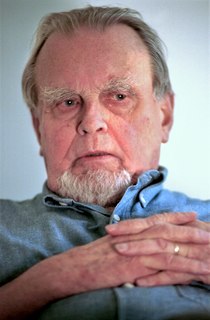A Quote by Czeslaw Milosz
The partition separating life from death is so tenuous. The unbelievable fragility of our organism suggests a vision on a screen: a kind of mist condenses itself into a human shape, lasts a moment and scatters.
Related Quotes
We live through myriads of seconds, yet it is always one, just one, that casts our entire inner world into turmoil, the second when (as Stendhal has described it) the internal inflorescence, already steeped in every kind of fluid, condenses and crystallizes—a magical second, like the moment of generation, and like that moment concealed in the warm interior of the individual life, invisible, untouchable, beyond the reach of feeling, a secret experienced alone. No algebra of the mind can calculate it, no alchemy of premonition divine it, and it can seldom perceive itself.
The corporeal element in man is a large screen and partition that prevents him from perfectly perceiving abstract ideals; this would be the case even if the corporeal element were as pure and superior as the substance of the spheres ; how much more must this be the case with our dark and opaque body. However great the exertion of our mind may be to comprehend the Divine Being or any of the ideals, we find a screen and partition between God and us.
The greatest mystery in life is not life itself, but death. Death is the culmination of life, the ultimate blossoming of life. In death the whole life is summed up, in death you arrive. Life is a pilgrimage towards death. From the very beginning, death is coming. From the moment of birth, death has started coming towards you, you have started moving towards death.
All death in nature is birth, and at the moment of death appears visibly the rising of life. There is no dying principle in nature, for nature throughout is unmixed life, which, concealed behind the old, begins again and develops itself. Death as well as birth is simply in itself, in order to present itself ever more brightly and more like to itself.
Any great artist is wrestling with their sadness and loneliness, their fears, anxieties and securities, and they're transfiguring those into complicated forms of expression that affect our hearts, minds and souls and remind us of who we are as human beings, the fragility of our human status and the inevitability of death.
When one existentially awakens from within, the relation of birth-and-death is not seen as a sequential change from the former to the latter. Rather, living as it is, is no more than dying, and at the same time there is no living separate from dying. This means that life itself is death and death itself is life. That is, we do not shift sequentially from birth to death, but undergo living-dying in each and every moment.
You have to remember one life, one death–this one! To enter fully the day, the hour, the moment whether it appears as life or death, whether we catch it on the inbreath or outbreath, requires only a moment, this moment. And along with it all the mindfulness we can muster, and each stage of our ongoing birth, and the confident joy of our inherent luminosity. (24)
Have you noticed that only in time of illness or disaster or death are people real? I remember at the time of the wreck-- people were so kind and helpful and solid. Everyone pretended that our lives until that moment had been every bit as real as the moment itself and that the future must be real too, when the truth was that our reality had been purchased only by Lyell's death. In another hour or so we had all faded out again and gone our dim ways.
This is the message of your life and my life - it’s that nothing lasts. Heraclitus said it: Panta Rhei. All flows, nothing lasts. Not your enemies, not your fortune, not who you sleep with at night, not the books, not the house in Saint-Tropez, not even the children - nothing lasts. To the degree that you avert your gaze from this truth, you build the potential for pain into your life. Everything is this act of embracing the present moment, the felt presence of experience, and then moving on to the next felt moment of experience. It’s literally psychological nomadism is what it is.
At the moment of death, there are two things that count: whatever we have done in our lives, and what state of mind we are in at that very moment. Even if we have accumulated a lot of negative karma, if we are able to make a real change of heart at the moment of death, it can decisively influence our future, and transform our karma, for the moment of death is an exceptionally powerful opportunity to purify karma.
Schwartz's research suggests something important: we can stretch our personalities, but only up to a point. Our inborn temperaments influence us, regardless of the lives we lead. A sizeable part of who we are is ordained by our genes, by our brains, by our nervous systems. And yet the elasticity that Schwartz found in some of the high-reactive teens also suggests the converse: we have free will and can use it to shape our personalities.






































